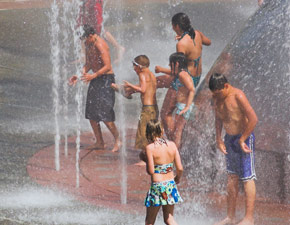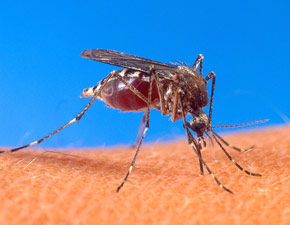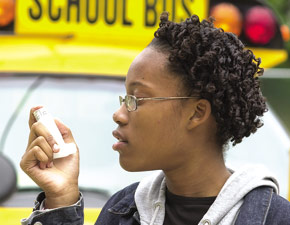
Health
Heat waves, air pollution, allergens like pollen and ragweed, and diseases linked to climate already threaten people's health in many areas of the world. Global climate change will increase these threats.
- As the Earth gets warmer, there will be more heat waves and they will last longer. More people will be at risk for illnesses like heat stroke and heat exhaustion.
- Warmer weather could also increase the amount of smog that forms in some areas. Smog can irritate your lungs, trigger asthma attacks, and even lead to serious heart and lung diseases.
- A warmer climate is also expected to promote the growth of mold, weeds, grasses, and trees that trigger allergic reactions and asthma in some people.
- Warmer temperatures can allow mosquitoes and other pests to spread to areas that were once too cold for them and allow them to transmit disease for a longer part of the year. Climate change can also increase the risk of waterborne diseases in some areas. Take an expedition to Southeast Asia to learn more about disease and climate change.
Learn about who is most affected and some of the things we can do to prepare now and in the future:
Heat Waves

Who Is Most Affected?
- People living in cities
- Children and elderly people
- People who are poor or living alone and without air conditioning
- People with lung or heart diseases
If a Heat Wave Happens...
- Stay inside where it is cool
- Drink plenty of fluids
- Wear cool, loose clothing and hats if you go outdoors
- Check up on friends, relatives, and neighbors who don't have air conditioning and might need help
To Prepare for the Future...
- Set up warning systems to alert people about heat emergencies
- Set up emergency cooling centers for people without air conditioning
- Make cities “cooler” by planting more trees and creating more parks
Disease

Who Is Most Affected?
- People in hot, tropical areas
- Campers, hikers, and others who spend time outdoors
To Keep From Getting Sick...
- Wear long sleeves and pants to avoid insect bites
- Use insect repellent
- Check yourself (and your pets) for ticks after you've been outside
- Know the symptoms of diseases like Lyme disease, and seek immediate medical attention if you suspect a problem
To Prepare for the Future...
- Track cases of infectious disease to see if they are spreading
- Make sure people get proper health care and vaccines
Air Pollution and Allergens

Who Is Most Affected?
- People with allergies and asthma (especially children)
- People with heart or lung diseases
- People living in cities
To Protect Your Health...
- Check the daily air quality forecast in the newspaper, on TV, on weather websites, or at www.airnow.gov
- Limit outdoor exercise when air pollution is high
To Prepare for the Future...
- Track allergy hotspots
- Reduce air pollution
- People are most vulnerable to heat waves in the hottest parts of the country. True or false?
Reveal answerFalse. Areas at most risk are those that experience a wide range of temperatures, where air conditioning is less common, and where people are not used to very hot temperatures.
- Plants produce about 1 billion grains of me in an average season. Climate change could boost my production by as much as 60 to 90 percent in some areas. When some people are around me, they sneeze a lot. What am I? Reveal answer
Pollen
- Can you name a type of disease that is transmitted by mosquitoes and is strongly influenced by climate conditions? Reveal answer
Malaria, West Nile virus, dengue, and many other diseases